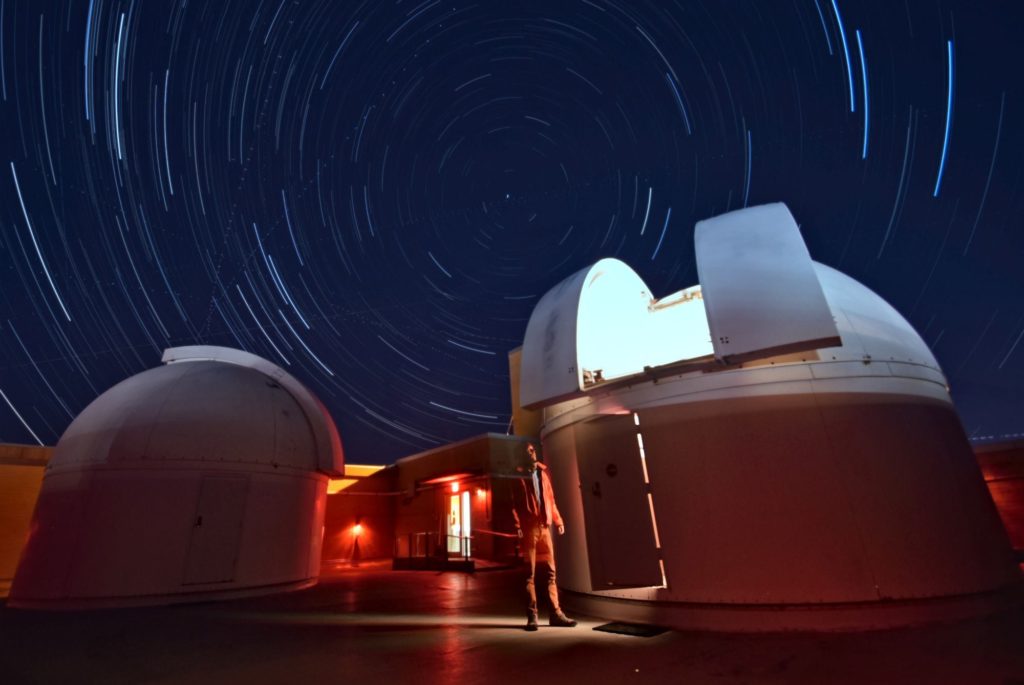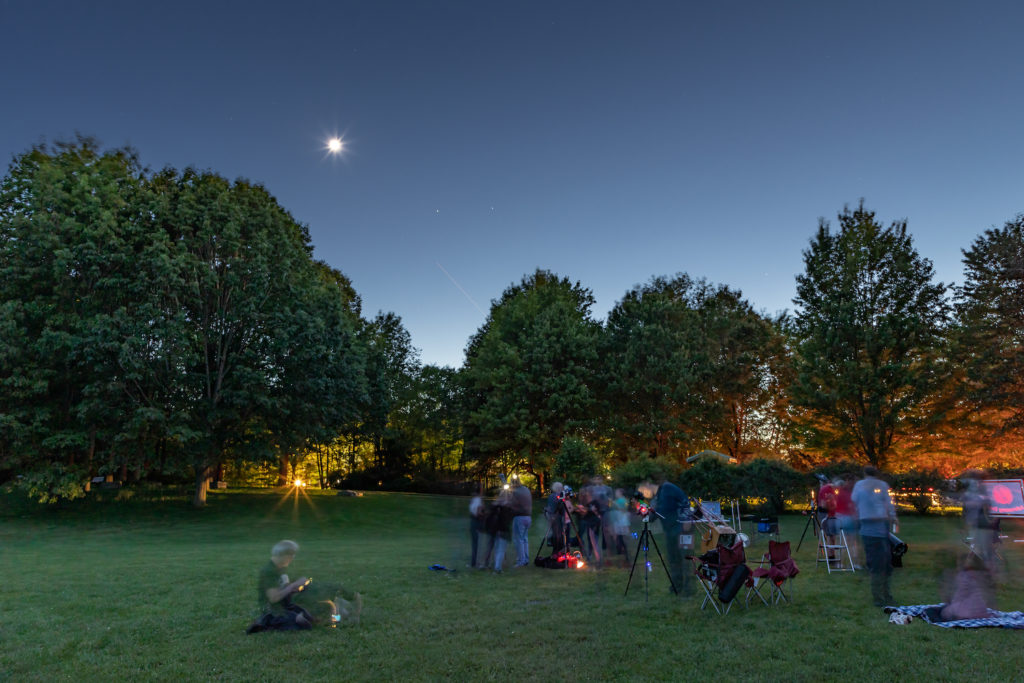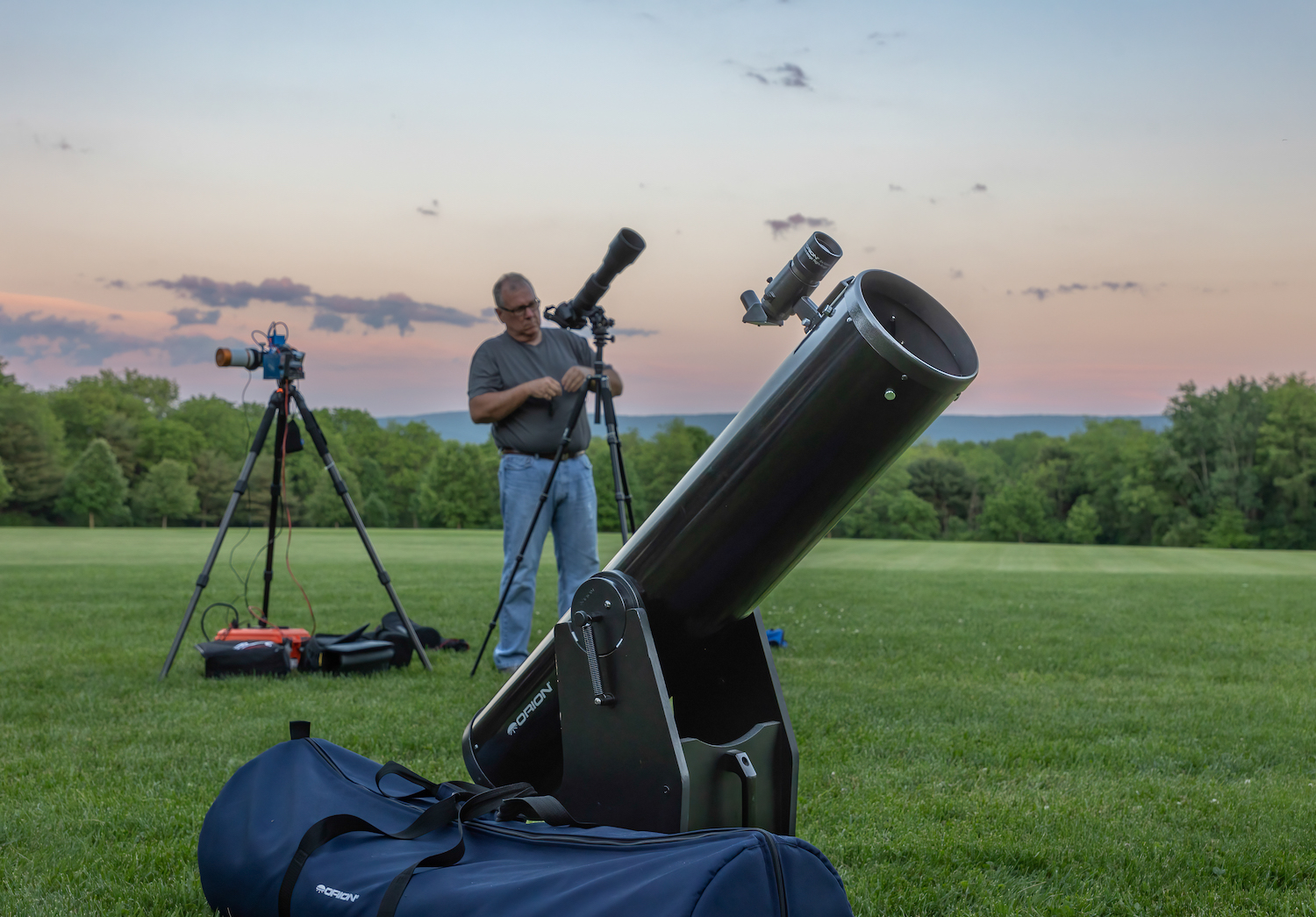When Galileo saw Jupiter, Venus, and our own moon clearly for the first time through an early version of the telescope in 1609, his observations changed our view of the world … and beyond.
Four centuries later, stargazers are still being changed by the very same views, according to Eric Feigelson, professor of astronomy and astrophysics in Penn State’s Eberly College of Science.
“I call it ‘transformative.’ I think it is personally transformative for someone who has never seen Saturn or even something as simple as the moon with a telescope. … You see it for the first time and you go, ‘Aah, it’s beautiful, how it just hangs there,’ and maybe you see the three moons of Jupiter, just like Galileo did. It’s just wonderful,” he says.
This outlook-altering experience is available to just about anyone locally throughout the year, thanks to stargazing opportunities provided by both Penn State and Central Pennsylvania Observers, a club made up of astronomy and space enthusiasts.
Providing these kinds of opportunities is a crucial part of Feigelson’s position as chair of the outreach committee in Penn State’s Department of Astronomy and Astrophysics.
“Public outreach is meaningful, in my opinion. It’s this wonderful synergy of scientists, the attractiveness of astronomy, and the public thirst—they generally like it. Astronomy is enormously attractive to everyone,” he says. “Science is often viewed as this innately boring thing, and that’s just not true. … I’ve been in other universities where the public outreach program is sort of a little boring. Here, it’s vibrant.”

For that, he credits Christopher Palma, current associate dean of Eberly College of Science, formerly the department’s first outreach officer, whom Feigelson says added more than 10 public programs to the department’s offerings during his tenure.
While the pandemic put a temporary halt to most in-person programming, Feigelson says in “normal” times the department’s outreach offerings include workshops and programs for teachers; camps and field trips for K-12 students; public lectures; and a week-long summer Road Scholar program for retirees.
In addition, every Friday during the fall and spring semesters, the Penn State Astronomy Club, a student organization, hosts free stargazing events on the roof of Davey Lab on campus. Students and the general public are given access to powerful telescopes under the guidance of faculty members and graduate students.
This spring, the astronomy department worked with the Department of Anthropology to develop Stories Under the Sky, held on the first Friday of each month (weather permitting) in the Childhood’s Gate section of the Arboretum at Penn State. The program is free to the public and includes storytelling of myths about the stars from different cultures, followed by astronomy lessons and stargazing opportunities.
After a two-year hiatus due to COVID, this summer the department brought back the popular AstroFest, held during the Central Pennsylvania Festival of the Arts in July and hosted at Davey Lab. Feigelson says AstroFest has been around since another department professor, Jane Charlton, came up with the idea in 1999. The event attracts up to 2,000 people who learn about everything from cosmic rays to black holes to quantum mechanics, and, of course, have the opportunity to observe the night sky through telescopes.
Skywatches and Star Parties
Penn State outreach programs are not the only way for local stargazers to get their fix.
Central Pennsylvania Observers hosts free monthly public viewing events, which they call Skywatches, from April through October.
Club President Steve Taylor explains, “I generally try and schedule the Skywatches near the new moon, because it’s best when you can only see a sliver of it. You’d think a full moon would be great, but when it’s shining straight down, you get no shadows and it’s blindingly bright—it’s like noon on the moon. But when you see it in crescent, when the sun is shining across it, now you can see the crevices and the mountains.”

Skywatches are frequently held at Tudek Park in Ferguson Township, where the club sets up telescopes belonging to individual members and invites the public to look through them. Club members are on hand to help visitors use the equipment and understand what they are seeing through the telescopes. While families are welcome, the events are aimed more toward adults, Taylor says. Skywatches are canceled if the skies are not clear due to weather.
Unfortunately, Taylor says, inclement weather is not the only impediment to clear viewing of the night skies. With continued development in State College bringing more street lights and building lights, Taylor says the stars are becoming increasingly difficult to see at night. To escape the lights, Ridge Soaring Gliderport in Julian was once a favorite viewing spot for CPO members, but since its recent closure, the club has been on the lookout for a new observing site to create or buy, Taylor says.
Meanwhile, truly dark skies and great viewing conditions can almost always be found at CPO’s signature event, its annual Black Forest Star Party at Cherry Springs State Park in Potter County.
“It’s one of the biggest star parties on the Eastern seaboard, and one of the darkest skies on the Eastern seaboard,” Taylor says.
The event, which serves as the club’s major fundraiser, will be held September 23-25 this year and is expected to draw amateur astronomers from across the country, most of whom will camp out in the park for the weekend, Taylor says. Tickets are $40 and he says the event, which is limited to 600 participants, sells out quickly.
Exoplanets and extraterrestrial life
CPO holds monthly meetings at South Hills Business School for its members, who join the club for $20 per year. The meetings are held on the first Thursday of each month and often feature lectures by Penn State researchers about important news in astronomy.
Exoplanets, which are planets outside of our solar system, are particularly of interest right now, according to both Taylor and Feigelson.
“Exoplanets are hot topics because the number of those is increasing exponentially. Thirty years ago, we weren’t sure there were any. Now we know there are many thousands,” Taylor says.
Feigelson goes even further, saying, “It’s only been known in our lifetime—the first discovery was in 1995—that every star you see up in the night sky has its own planetary system. Carl Sagan speculated, but he didn’t know. The ancient Greeks speculated, but they didn’t know. Nobody knew, until our generation. We’ve learned an enormous amount of things, and people are interested.”
Other favorite topics right now include black holes and the possibility of life on other planets.
Penn State is a leader in research in these and many other areas of astronomy and astrophysics. With over 20 tenure-track professors and 60 graduate students, as well as 15 undergraduate students graduating each year, Penn State has one of the largest and best-funded astronomy departments in the country.
The Penn State Extraterrestrial Intelligence Center, run by Jason Wright of the Department of Astronomy and Astrophysics, is dedicated to the search for evidence of life on other planets through communicative signals and other indications.
In other departments such as aerospace engineering, Penn State scientists are involved in the search for life in other ways, including collaborating with rocket scientists from Johns Hopkins University to build a drone to explore Titan, Saturn’s biggest moon, for signs of life.
“We are part of the centuries-long debate over, to use American modern terms, ‘Are we alone? Are there aliens out there?’ … There are a lot of planets like earth, with a lot of water, a lot of chemistry, a lot of ingredients for life,” Feigelson says. “With the discovery of exoplanets, there is more acceptance about the possibility of life than there was a few years ago. The ingredients are there. It’s an example of why astronomy is so interesting.”
Feigelson says making the science of astronomy appealing and accessible to the public, and especially to young people, is so important to the federal government and what he calls their “STEM employment pipeline” that agencies like NASA and the National Science Foundation provide funding to Penn State’s department for outreach as well as for research.
But the department is now seeking more funding from major donors, Feigelson says, as it plans to build a new planetarium that better reflects the excellence of the department than the tiny, almost 40-year-old planetarium in Davey Lab. The new, state-of-the-art planetarium is being planned for the Arboretum Education Center complex at the Arboretum at Penn State, near the new Palmer Museum of Art.
“We are waiting for a multi-million-dollar gift to Penn State so we can build the biggest and best planetarium between Pittsburgh and Philadelphia,” Feigelson says. “[Buhl Planetarium and Franklin Institute] are full of kids. It would be the same here. It would attract a lot of people from other counties.”
For information about all of Penn State’s astronomy and astrophysics outreach programs, visit science.psu.edu/astro/public-outreach. For information about Central Pennsylvania Observers public events and membership, visit cpoclub.org.
Free Stargazing
All activities are free and weather permitting.
- Penn State Astronomy Club: Stargazing on Friday evenings during fall and spring semesters on the roof of Davey Lab. science.psu.edu/astro/public-outreach.
- Central Pennsylvania Observers: Monthly skywatches at Tudek Park, including Sept. 2 at 8:30 p.m. cpoclub.org
- Stories Under the Sky: Storytelling of myths about the stars followed by astronomy lessons and stargazing. First Fridays, including Sept. 2 at 7:45 p.m. at the Arboretum at Penn State.
Karen Walker is a freelance writer in State College. This story appears in the August 2022 issue of Town&Gown.



